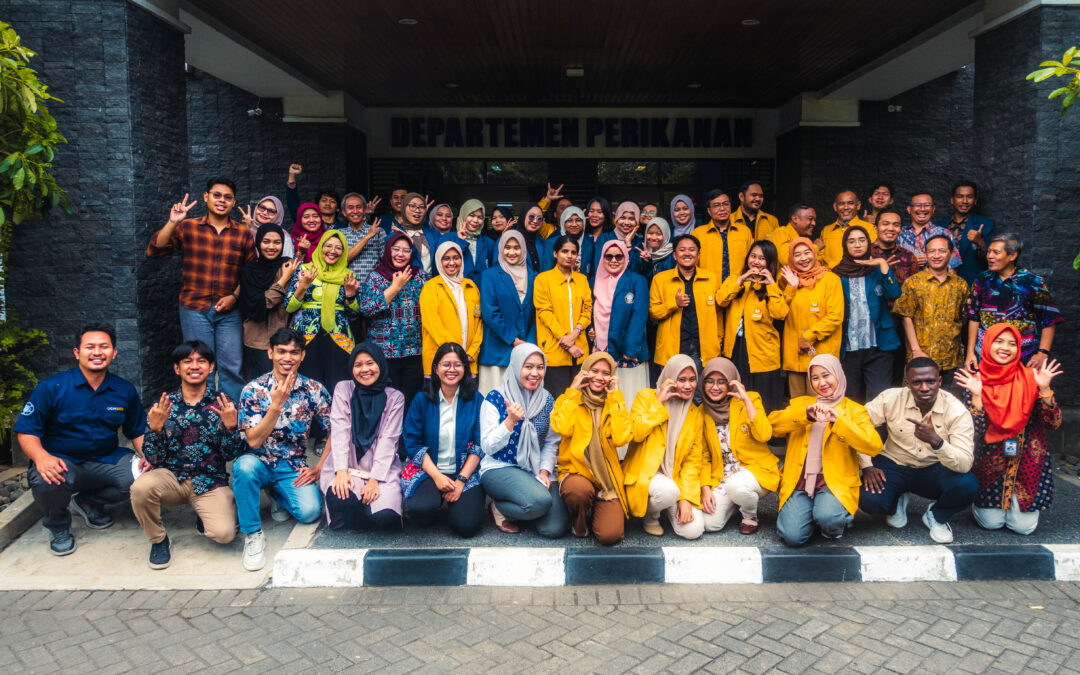Yogyakarta, November 12, 2025
On November 12, 2025, a routine program, an annual event, was held: the Master’s Consortium for Fisheries and Marine Sciences, located at the Master’s of Fisheries Science, Gadjah Mada University, Yogyakarta, as the host study program.
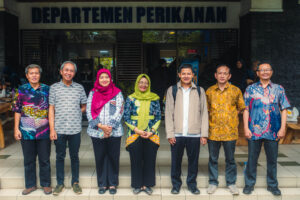
The Masters of Fisheries and Marine Sciences Consortium was first initiated by Gadjah Mada University (UGM) and Diponegoro University (Undip) and initially took shape in 2023, hosted by Diponegoro University. In 2024, this activity continued at Jenderal Soedirman University in Purwokerto, and in 2025, it took place at Gajah Mada University in Yogyakarta. The Academic Traveling program aims to enhance students’ academic journeys and provide travel adventures with expert learning tips, research advice, and insightful destination guides.
This activity is to get to know more closely several Fisheries and Marine Science Study Programs in Indonesia through the Dissemination of Research Results of Masters Students in Fisheries and Marine Science and currently joining are Diponegoro University, Gadjah Mada University, Jenderal Soedirman University and Airlangga University.
Entering its third year, the Master’s Program in the same group has merged into seven study programs, including:
- Master of Aquatic Resource Management – Diponegoro University (UNDIP)
- Master of Marine Science – Diponegoro University (UNDIP)
- Master of Fisheries Science – Gadjah Mada University (UGM)
- Master of Aquatic Resources – Jenderal Soedirman University (UNSOED)
- Master of Marine Science – Jenderal Soedirman University (UNSOED)
- Master of Fisheries Science – Airlangga University (UNAIR)
- Master of Fisheries and Marine Biotechnology – Airlangga University (UNAIR)
This activity began with remarks from the Head of the UGM Fisheries Department, Prof. Dr. Ir. Alim Isnansetyo, M.Sc., remarks from the Head of the UGM Fisheries Science Masters Study Program, Dr. Eko Setyobudi, S.Pi., M.Si. The next event continued with the introduction of delegation members from each agency and the collection of documentation.
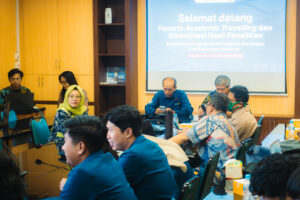
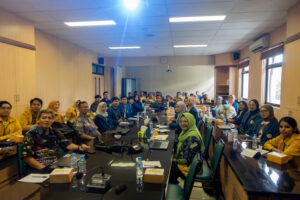
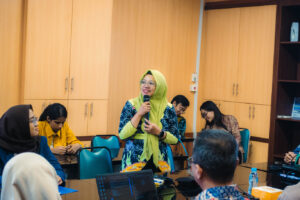
Entering the main event, namely the presentation of research results from 16 student representatives from Study Programs, including the following:
- Master’s Program in Aquatic Resource Management, Faculty of Fisheries and Marine Sciences, Diponegoro University.
▪ Noor Maulida: Microplastic Concentration in Aquatic Ecosystem Components of the Kedung Ombo Reservoir, Central Java: Analysis of Water, Tilapia (Oreochromis mossambicus), Sediment, Macroalgae, and Gastropods
▪ Hanan Az Zahra: Analysis of Nipah Nipa (Nypa fruticans) Biomass, Carbon, and Chlorophyll Based on Field Data, Sentinel-2A Imagery, and UAVs on the East Coast of Sumatra, West Tanjung Jabung, Pangkal Babu, Jambi
- Master’s Program in Marine Science, Faculty of Fisheries and Marine Sciences, Diponegoro University.
▪ Yulita Dwi Astuti: Study of the Presence of Genetic Material in Deep-Sea Fish in the Pantar Strait, Alor Island, East Nusa Tenggara Through eDNA Analysis During Extreme Upwelling
▪ Willy Wulansari: Characteristics of Marine Heatwaves in the Java Sea Based on Sea Surface Temperature Data Through Satellite and In-Situ Observations
▪ Candra Wahyuningsih: Bioprospecting of Microplastic-Degrading Bacteria in the Mangrove Rehabilitation Area, Mojo, Pemalang
- Master’s Program in Aquatic Resources Management, Faculty of Fisheries and Marine Sciences, Jenderal Soedirman University
▪ Zulfaz Haryo F: Analysis of the Physiological Stress Response of Brek Fish (Barbonymus balleroides) in a Recirculating System: Characterization and Optimization Approach to Captive Breeding
▪ Masfu’ah: Analysis of Microplastic Contamination in Smoked Fish in Rembang Regency: Implications for Food Security
- Master’s Program in Marine Science, Faculty of Fisheries and Marine Sciences, Jenderal Soedirman University
▪ Swietenia Purnamasari: Study of Carotenoid Content of Gracilaria sp. in Silvofishery Areas
▪ Mehwish Jamil: Discovery of Bioactive Natural Compounds from Marine Bacillus
▪ Adnan Dendy: Maritime chemotherapeutic Study of Changes in Mangrove Area and Potential for Tidal Flooding in the Southern Waters of Cilacap
- Master’s Program in Fisheries Science, Faculty of Fisheries and Marine Sciences, Airlangga University
▪ Filimi Agniny: Evaluation of Activity and Total Protein of Recombinant Cellulase Enzyme with Mutation Variations and Addition of SKIK TAG
▪ Yasha Husnacahya: Title: Analysis of Physiological Response of Whiteleg Shrimp (Litopenaeus vannamei) Cultivated in Artificial Seawater Using Bittern
- Master’s Program in Fisheries and Marine Biotechnology, Faculty of Fisheries, Airlangga University
▪ Cut Syarifah Zahara: Analysis of the Potential of Multistrain Probiotic Drink Fermentation Waste as a Feed Additive in Vannamei Shrimp Feed
▪ Syalyvia Hamidah: Characterization of Porang Glucomannan/Alginate-Based Smart Packaging with Grape Skin Extract. Moondrop: Shrimp Freshness Monitoring Application
- Master’s Program in Fisheries Science, Department of Fisheries, Gadjah Mada University
▪ Jessica Balalembang: Analysis of the Sustainability of Fly Fishing with Purse Seine at the Lonrae Fish Landing Base, Bone Regency
▪ Joas Iradukunda: The Influence of Prebiotic Inulin and Probiotic Cocktail of Bacillus-Lactococcus in Feed on Intestinal Enzyme Activity, Gene Expression, Histology, and Growth of Red Hybrid Tilapia (Oreochromis sp.)
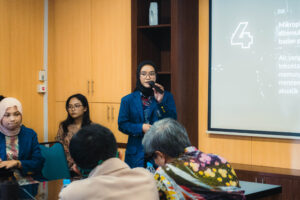
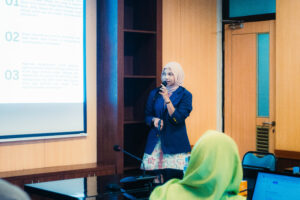
The student delegation from the Aquatic Resources Management Study Program, Faculty of Fisheries and Marine Sciences, Diponegoro University, is as follows: Devi Oktavia, Ester Losung, Hanan Az Zahra, Noor Maulidah, Johan Yesanto, Titik Tri Hartati, Chaerul Umam, Fitria Sari, Muhammad Kukuh Prihardianto, Muhammad Naufal Dhiya, and Nurul Aulia Dinastuti.
The accompanying lecturers are Dr. Aninditia Sabdaningsih, S.Si, M.Si (Head of the Study Program) and Dr. Churun Ain, S.Pi, M.Si (Head of the Aquatic Resources Department).
Participants reported that the program provided a memorable first experience as Master’s students in the Fisheries and Marine Sciences program. The program offered new insights into research topics related to current issues in the fisheries sector, provided a space for information sharing, and strengthened relationships among fellow Master’s students in the Fisheries and Marine Sciences program.
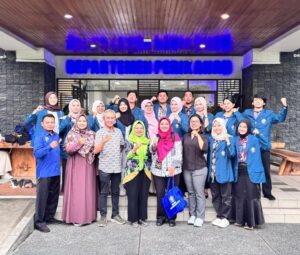
The dissemination of research results from the 2025 Master of Fisheries and Marine Sciences program is expected to support the success of the SDGs, particularly in:
SDG 3 (Good Health and Well-Being) ensures healthy lives and well-being for all at all ages;
SDG 4 (Quality Education) aims to ensure that all people complete quality primary and secondary education;
SDG 9 (Industry, Innovation, and Infrastructure) emphasizes resilient infrastructure development, inclusive industrialization, and innovation;
SDG 13 (Climate Action) focuses on addressing climate change;
SDG 14 (Life Below Water) aims to conserve the oceans, seas, and marine resources for sustainable development; and
SDG 17 (Partnerships for the Goals) is about global partnerships to achieve all sustainable development goals.
